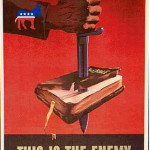We run our website the way we wished the whole internet worked: we provide high quality original content with no ads. We are funded solely by your direct support. Please consider supporting this project.
In a democracy, don’t Christians have a responsibility to participate in politics?
Question: You’ve argued that Christians shouldn’t try to gain power in government on the grounds that Jesus didn’t try to gain power in the political system of his day. But his government didn’t allow for such power. Caesar and Pilate weren’t elected by anyone. Our government allows for this. So don’t we have a responsibility to participate in politics to try to change society?
Answer: It’s true that the political system under which Jesus lived was very different from any democracy. But as Christ’s ambassadors from a different “country” (for “our citizenship is in heaven” [Phil. 3:20]), and as “foreigners” and “exiles” in our own country (2 Cor 5:20; I Pet 2:11), I don’t see that our basic stance toward government should be affected by the kind of government we happen to be under. We’re never to get too involved in the affairs of this foreign land but are always to keep our focus on pleasing our commanding officer (1 Tim. 2:4). All of our trust is to be placed in the power we have to change the world by imitating Christ’s self-sacrificial lifestyle, not in the power of laws that control behavior.
As followers of Jesus, therefore, it shouldn’t make any substantial difference whether the country we live in is democratic, socialistic, totalitarian, or communistic. We are missionaries in a foreign land wherever we are. We are guerilla warriors stationed behind enemy lines, called to topple the existing regime which is controlled by our captain’s arch enemy (1 John 5:19).
It may be easier to do our ministry in a democratic country and we thank God for this. But there are drawbacks as well, such as succumbing to the apathy that too often comes as we live with relative comfort and ease in a wealthy economy, being co-opted by non-Christian values, mistakenly placing our hope for redemption in political systems rather than the gospel, and so on.
The Kingdom we represent, and the Kingdom that will ultimately take over the world, is different from any of the other kingdoms of this world. We are called to change the world, but not by the means the world uses. Our power to change the world is rooted is prayer and sacrificial love. Our hope should be placed in nothing other than our Lord using us as we follow Jesus’ example to transform the world in a way the political systems of this present world cannot. Whatever distracts us from this one task must be avoided.
This doesn’t mean it’s wrong to participate in politics. It just means we have to be careful to keep this participation distinct from the Kingdom of God and careful not to place our ultimate trust in it.
Category: Q&A
Tags: Politics, Q&A, Social Issues
Topics: Ethical, Cultural and Political Issues
Related Reading

Was Noah’s flood global or local?
Though many regard the biblical story of a great flood in the days of Noah to be an ancient legend, evangelical Christians affirm it as historical fact because Scripture presents it as such. However, a debate has arisen during the last two hundred years as to whether the flood was global or local. Those who…

Is the Bible against body piercing and tattoos?
Some Christians argue against body piercing and tattoos on the basis of a couple of Old Testament verses that prohibit them (Lev. 19:28). Several years back an aggravated lady tried to get me to preach against these things in my church (she’d observed that a number of people in the congregation had body piercings and…

12 Reasons for Keeping the Kingdom of God Separate from Politics, Part 1
Image by the justified sinner via Flickr Jesus came to establish a kingdom that was not of this world. This is why Jesus refused to call on angels to defend himself and why he forbid his followers to use violence to defend themselves or advance their cause. It’s also why neither Jesus nor Paul nor…

How do you respond to Matthew 16:21?
“From that time on, Jesus began to show his disciples that he must go to Jerusalem and undergo great suffering at the hands of the elders and chief priests and scribes, and be killed, and on the third day be raised.” The ministry and death of Jesus are the centerpieces of God’s plan in world…

What is the significance of Numbers 14:12–20?
In response to Israel’s bickering the Lord says “I will strike them with pestilence and disinherit them, and I will make of you [Moses] a nation greater and mightier than they” (vs. 12). Moses asks the Lord to forgive the people, and the Lord eventually responds, “I do forgive, just as you have asked” (vs.…

“Pulpit Freedom Sunday” and the Call to Politicize the Pulpit
Religion Dispatches online magazine shared an article in which conservative evangelical leaders are calling on pastors to dare the government to sue them by using their pulpit to speak out against Obama and other “ungodly” candidates. They are hosting “Pulpit Freedom Sunday” on October 7th in an effort to shame pastor’s “timidity” and get them to…
